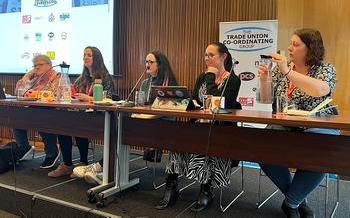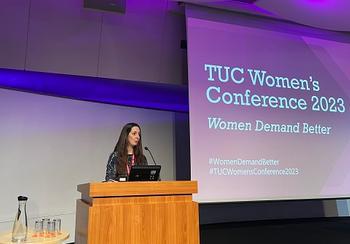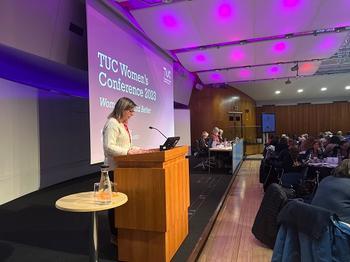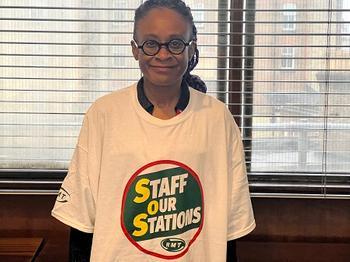TUC Women's conference 2023
The cost-of-living crisis, gender pay gaps, job adverts, violence against women and football boots were all up for discussion.

It’s patriarchy.
That was the conclusion of one delegate at the TUC Women’s Conference at a fringe meeting on Tackling misogyny: the role of unions. Bubbling with frustration at not being able to join the discussion, because time had run out, she leapt to the stage and had her say.
All that morning, she said, delegates had heard about women being killed by men, women being sexually harassed at work, women being paid less and losing out on pensions, women bearing the brunt of the cost-of-living, women’s health issues being ignored, and women’s rights, including access to abortion, being eroded. The reason: patriarchy.
The dictionary meaning of misogyny (noun) is the “dislike of, contempt for, or ingrained prejudice against women”. And the women on the fringe meeting platform, Janet Farrar, president of the lecturers’ union UCU, Louise Atkinson, president of the National Education Union, Natasha Hirst, vice-president of the NUJ, Sarah Woolley, general secretary of the bakers’ union BFAWU and Jackie Marshall of the Prison Officers’ Association, all had plenty of stories of misogyny in their own personal and working lives – barriers created by men to make women feel “undervalued, underpaid and not having rights over their own bodies”.
They (and the audience) agreed that while unions had a huge role to play in tackling misogyny, many had experienced it within their own union.
This was acknowledged by Paul Nowak in his first speech to the women’s conference as TUC general secretary. Referencing the recent report into sexual harassment and bullying at the transport union TSSA, he said it shamed the movement. “If we are not a welcoming space for all workers, in all our diversity, then we will fail…As a senior man in our movement, I want every woman to feel her union is a safe and inclusive place to be.”

Natasha Hirst, NUJ vice-president, spoke about the levels of abuse and harassment women journalists face – with a new report published on International Women’s Day showing three-quarters of UK women journalists had been threatened and felt unsafe in their work. “The majority of our members surveyed agreed that abuse and harassment had become normalised and was seen as part of the job”, she said, “and they shared so many horrific and upsetting experiences with us. Women have as much of a right to exist safely in the digital space as we do in the physical world. But increasingly, women journalists are being forced into self-censoring or withdrawing from online spaces and even from journalism altogether, because of the abuse they suffer.”
The union has produced a safety toolkit which gives members advice on how to protect themselves and their communications and as part of the National Committee for the Safety of Journalists is working with the government on policies to stop the abuse.
In a later debate about the supporting women’s struggles across the globe, NUJ delegate Ann Galpin said: “Ten women journalists were killed in the line of duty in 2022, most of them reporting from conflict zones. Women journalists face extreme challenges while reporting on the ground, from military attacks and threats to police intimidation, surveillance and gender-based violence. Violence and abuse are used as tools to silence them.”
She said women’s stories needed to be told and their voices heard – from what’s happening in the local village to a national government’s policy. “And that’s why our BBC local radio members are going on strike next Wednesday, Budget Day, to protect BBC local radio services,” she said.
The motion noted the assassination of Al Jazeera journalist Shireen Abu Aqleh who was killed while covering an Israeli army operation in Jenin, in the northern West Bank, while her team was clearly marked in press gear. Women media workers in Afghanistan continue to face threats to their security and safety under the Taliban. Fewer than 12 per cent of women working in media in Afghanistan have remained employed since August 2021, said Ann.
The NUJ’s motion to conference, proposed by Raj Ford and passed unanimously, expressed solidarity with the “brave Iranian women and men who have taken to the streets to demand the end of oppression and discriminatory laws, following the death of Mahsa Amini in the custody of the so-called morality police” and also noted journalists in the UK, working for the BBC Persian Service and Iran International, had seen an escalation of threats to them and their families since the start of the protests.
The union’s second conference motion concerned the need for more pay transparency in job adverts. Research shows that 40 per cent of UK job adverts in 2022 did not disclose the position’s salary, and the Press Gazette recently reported that most UK news organisations do not disclose pay levels.

Cristina Lago said: “Instead of disclosing the salary or pay range for a job, employers often note that wages will be ‘dependent on experience’ or ‘competitive’ – empty terms which in most cases mean that your interviewer will decide how much they are willing to pay you only after they’ve seen you – and we know that this leaves an open door to discrimination. Conference, we shouldn’t have to wrestle during a job interview to get a fair salary that is the same as our male counterparts.”
Conference agreed unanimously that the TUC would lobby government, employers’ bodies and employers to normalise the publication of pay rates, salaries and salary bands in employment adverts.
Many of this year’s motions noted how women had been disproportionately exposed to the most severe impacts of the cost-of-living crisis. A motion moved by Unison said: “This is a worsening of the economic, physical and emotional toll on women which arose during the pandemic where women were more likely than men to lose their jobs and suffer greater anxiety from increased caring or childcare burdens and female pension inequality.
“Over a decade of austerity and cuts to social security have left many women in poverty. Wages have stagnated. Women's wages have increased at a slower rate than men. Women will bear the brunt of rising food prices as the 'shock absorbers of poverty'. This is a gendered crisis and low paid, Black and minority ethnic women and disabled women are likely to be at the sharp end.
“More than 68 per cent of women are struggling to pay their household bills, and this figure rises to over 80 per cent in Black, Asian and minority ethnic women.”
The high cost of childcare in the UK meant that more than a third of women who are not working but want to are prevented from doing so because of childcare costs and a lack of flexible working.
The NUJ, together with sister unions in the creative industry, spoke about how the cost-of-living crisis had further eroded the economic plight of freelances. Natasha Hirst said: “About one third of the NUJ’s membership is freelance. We have far fewer rights at work. No holiday pay or sick pay. On the days we don’t work, most of us have no income. There are fewer opportunities to call out poor terms and conditions, safety issues, bullying and harassment. That opens us up to exploitation and further depresses our income and increases the pay gap. The trade union movement is the last line of defence.”
As women in the hall discussed violence against women, Jess Phillips MP was in the House of Commons reading the names of the 109 women killed in UK over the past year by men. It took more than five minutes – the youngest victim was 15 and the oldest 92. Paul Nowak had recalled the names of killed women Zara Aleena, Nicola Smallman, Bibaa Henry and Sarah Everard in his speech.
He said they had been failed by the authorities meant to protect them and the behavior within the Met Police, as shown in vile WhatsApp exchanges, was that of institutionalised sexism, misogyny, racism and homophobia. Much the same as the London Fire Brigade independent Cultural Review, as highlighted in a Fire Brigades Union’s motion, which condemned the attitudes shown towards women, Black, Asian and minority ethnic, LGBT+ and neurologically diverse staff.

Many of the motions – on pay, food banks, pensions, sexual harassment and gender pay and pension gaps– are issues shared across the piece and unions can work with the TUC on joint campaigns. Others were more industry specific. There was great support at conference for the women from the rail unions RMT and Aslef, wearing their Staff our Stations T-shirts. They said proposals to close ticket halls and to have driver-only trains made public transport less safe, secure and accessible for women and girls. Conference heard delegates complain about international conventions and domestic legislation which still refer to ‘seaman’ in official documents and job titles such as able seaman in the maritime industry. A motion from the Royal College of Podiatry said it was a a disgrace that in 2022 – especially following the successful Euros win by the Lionesses – that girls and women are wearing sports footwear designed for men.
International Women's Day 2023
